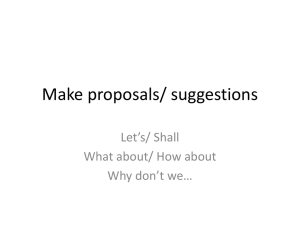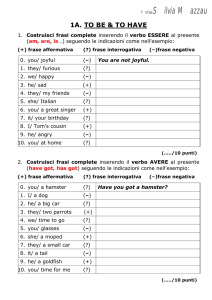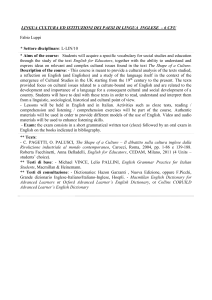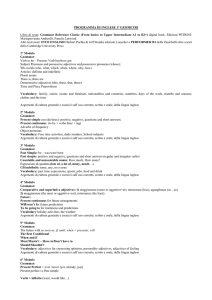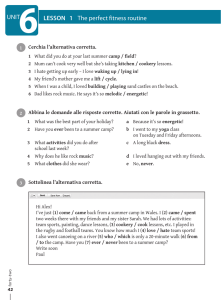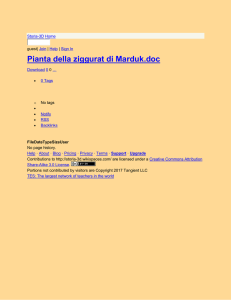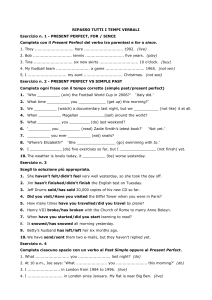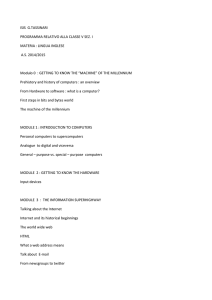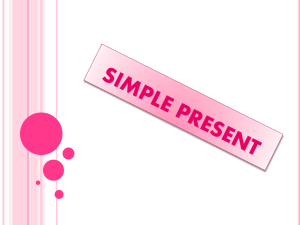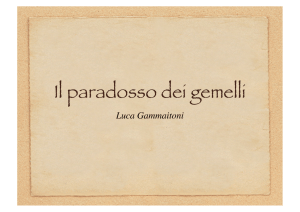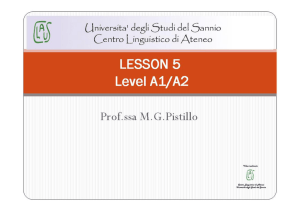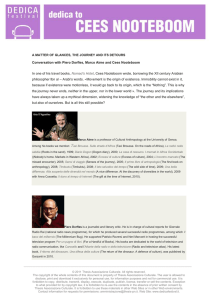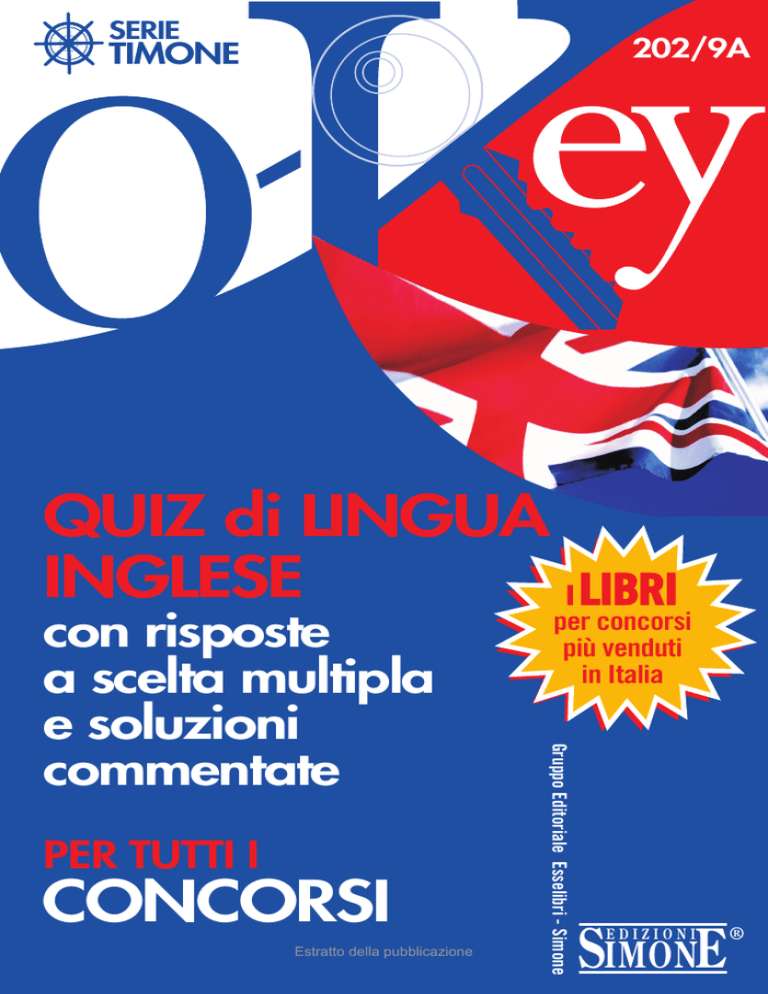
SERIE
202/9A
TIMONE
QUIZ di LINGUA
INGLESE
i LIBRI
PER TUTTI I
CONCORSI
Estratto della pubblicazione
per concorsi
più venduti
in Italia
Gruppo Editoriale Esselibri - Simone
con risposte
a scelta multipla
e soluzioni
commentate
SIMONE
EDIZIONI
®
TUTTI I DIRITTI RISERVATI
Vietata la riproduzione anche parziale
Finito di stampare nel mese di gennaio 2010
dalla Officina Grafica Iride - Via Provinciale Arzano-Casandrino, VII trav., 24 - Arzano (NA)
per conto della ESSELIBRI S.p.A. - Via F. Russo 33/D 80123 - Napoli
Grafica di copertina a cura di Giuseppe Ragno
Estratto della pubblicazione
PREMESSA
Strumenti essenziali per chi si appresta a sostenere concorsi, esami o
colloqui di lavoro, i volumetti della collana O-Key consentono lo studio e il
ripasso di diverse materie, dalla Grammatica italiana alla Letteratura,
dalla Storia alla Geografia, dall’Inglese all’Informatica e all’Attualità.
La struttura, improntata alla massima funzionalità, consente di apprendere rapidamente i concetti indispensabili a una conoscenza generale ma non
lacunosa degli argomenti. Semplicità del linguaggio, aggiornamento dei
contenuti e un’estrema praticità d’uso completano le caratteristiche di ogni
singolo testo.
Questo volume propone, in particolare, una serie di quiz di lingua
inglese articolati in quattro questionari a difficoltà di livello variabile, utili
per mettere alla prova le conoscenze specifiche e la competenza individuale
in materia di padronanza delle regole grammaticali dell’idioma britannico.
Le diverse batterie, composte da item a risposta multipla, sono quasi tutte
corredate anche di soluzioni commentate, per una più agevole ed attenta
verifica dei contenuti trattati.
Per un rapido ed esaustivo approfondimento di tutti i principali argomenti
della grammatica inglese si rimanda, invece, allo studio dell’apposito
volume pubblicato dalla casa editrice nella stessa collana: Grammatica
inglese per tutti i concorsi (cod. 202/9).
QUESTIONARIO N. 1
LINGUA INGLESE (I LIVELLO)
Inserire la forma verbale corretta.
1) My name … Annie. I … a teacher
❏
❏
❏
❏
a)
b)
c)
d)
is - am
is - are
has - am
are - am
2) Mary always … elegant dresses
❏
❏
❏
❏
a)
b)
c)
d)
buies
buys
is buying
buyies
3) Paul is in the garden, he … some flowers
❏
❏
❏
❏
a)
b)
c)
d)
picking
picks
is picking
pick
4) Tom … on the sand
❏
❏
❏
❏
a)
b)
c)
d)
lyeing
is leing
lie
is lying
Estratto della pubblicazione
6
Questionario n. 1
5) I … to any political party
❏
❏
❏
❏
a)
b)
c)
d)
don’t belong
am not belonging
not belong
not am belong
6) My grandparents … a wonderful garden
❏
❏
❏
❏
a)
b)
c)
d)
don’t have got
hasn’t got
don’t got
haven’t got
7) He … speak English very well
❏
❏
❏
❏
a)
b)
c)
d)
are able
cans
is
can
8) He … be silent!
❏
❏
❏
❏
a)
b)
c)
d)
have to
must
musts
has
Inserire l’articolo appropriato.
9) Peter is … honest man
❏
❏
❏
❏
a)
b)
c)
d)
a
the
an
Estratto della pubblicazione
Lingua inglese (I livello)
10) ... war is a terrible thing
❏
❏
❏
❏
a)
b)
c)
d)
the
an
a
-
11) I want to ask for … information about that man
❏
❏
❏
❏
a)
b)
c)
d)
the
an
a
12) This is … unique piece of my collection
❏
❏
❏
❏
a)
b)
c)
d)
an
a
as
Completare la frase.
13) My brother is … engineer. He lives … London
❏
❏
❏
❏
a)
b)
c)
d)
a - in
an - at
-; by
an - in
14) Jane is … ... hospital now because her son had an accident
❏
❏
❏
❏
a)
b)
c)
d)
at the
at
in the
into the
Estratto della pubblicazione
7
8
Questionario n. 1
15) Many people are … prison for … crimes they have not committed
❏
❏
❏
❏
a)
b)
c)
d)
at; in - the
in; into; -
16) Who is … man over there?
❏
❏
❏
❏
a)
b)
c)
d)
these
this
a
that
17) … two skirts here are mine
❏
❏
❏
❏
a)
b)
c)
d)
these
this
those
the
Indicare la frase corretta.
18) ❏
❏
❏
❏
a)
b)
c)
d)
Catch you the train at 7.00 every morning?
Is your brother a clerk?
Do you are a teacher?
Come to see me tomorrow
19) ❏
❏
❏
❏
a)
b)
c)
d)
Does he is your husband?
Do you have got a black cat?
When do you are leave?
Do you live in Manchester?
20) ❏
❏
❏
❏
a)
b)
c)
d)
I don’t believe in ghosts
I doesn’t believe in ghosts
I believe not in ghosts
I believes not in ghosts
Lingua inglese (I livello)
21) ❏
❏
❏
❏
a)
b)
c)
d)
Must you to study tonight?
Does you must study tonight?
Do you must study tonight?
Must you study tonight?
22) ❏
❏
❏
❏
a)
b)
c)
d)
I don’t can swim
I can’t to swim
I cannot swim
I not can swim
23) ❏
❏
❏
❏
a)
b)
c)
d)
Do you really have going?
Have you really to go?
Do you really have to go?
Does you really have to go?
Completare la frase.
24) Can you pass me those ..., please?
❏
❏
❏
❏
a)
b)
c)
d)
brushes
brushs
brush
bushies
25) I have three …: a son and two ...
❏
❏
❏
❏
a)
b)
c)
d)
childrens - daughteres
children - daughters
childs - daughters
childes - daughters
26) On one of those … there are two small ....
❏
❏
❏
❏
a)
b)
c)
d)
shelve - knifes
shelves - knifes
shelfs - knives
shelves - knives
9
10
Questionario n. 1
27) Your … are really nice
❏
❏
❏
❏
a)
b)
c)
d)
sisters-in-law
sisters-in-laws
sister-in-laws
sister-in-law
28) Who are those … over there?
❏
❏
❏
❏
a)
b)
c)
d)
person
peoples
people
Indicare la frase corretta.
29) ❏
❏
❏
❏
a)
b)
c)
d)
I love rose reds
I love reds roses
I love roses red
I love red roses
30) ❏
❏
❏
❏
a)
b)
c)
d)
Are your parents Britishes?
Are your parents Britishs?
Are your parents British?
Do you are parent British?
31) ❏
❏
❏
❏
a)
b)
c)
d)
What lovely girl!
What a lovely girl!
She is a such lovely girl!
What an girl lovely!
Completare la frase.
32) I don’t live with … parents anymore
❏
❏
❏
❏
a)
b)
c)
d)
mine
me
the
my
Lingua inglese (I livello)
33) Some friends of … are sleeping here tonight
❏
❏
❏
❏
a)
b)
c)
d)
theirs
mines
our
they
34) I want to introduce you to Mary and … brother
❏
❏
❏
❏
a)
b)
c)
d)
hers
his
the
her
35) Whose book is this? It is ...
❏
❏
❏
❏
a)
b)
c)
d)
hims
her
his
its
36) Peter and … share a very small flat in the centre
❏
❏
❏
❏
a)
b)
c)
d)
mine
I
me
my
37) Mike is going to the cinema and I want to go with ...
❏
❏
❏
❏
a)
b)
c)
d)
he
his
him
hims
38) Tell the police the truth please, or … will arrest you!
❏
❏
❏
❏
a)
b)
c)
d)
them
they
it
Estratto della pubblicazione
11
12
Questionario n. 1
39) Give … the right wage for … work
❏
❏
❏
❏
a)
b)
c)
d)
ours - our
his - him
us - ours
us - our
Indicare la frase corretta.
40) ❏
❏
❏
❏
a)
b)
c)
d)
This is the garden of my grandparents
This is my grandparents’ garden
This is my grandparents’s garden
This is the my grandparent’s garden
41) ❏
❏
❏
❏
a)
b)
c)
d)
My boss’ car is black
My boss’s car is black
My boss car is black
The my boss car is black
42) ❏
❏
❏
❏
a)
b)
c)
d)
Whose this watch? It’s hers
Whose watch is this? It is hers
Whose of watch is this? It is Amy’s
Whose this is watch? It’s she
43) ❏
❏
❏
❏
a)
b)
c)
d)
I need a ten minutes’ break
I need a ten minute breaks’
I need a break’s ten minutes
I need a ten minute break’s
Inserire la preposizione giusta.
44) I’m very interested … history
❏
❏
❏
❏
a)
b)
c)
d)
in
on
of
above
Estratto della pubblicazione
Lingua inglese (I livello)
13
45) I’m sorry but I can’t look … your children tonight, I have a date
❏
❏
❏
❏
a)
b)
c)
d)
about
then
for
after
46) I’m ashamed … what I’ve done
❏
❏
❏
❏
a)
b)
c)
d)
of
for
about
around
Indicare la grafia corretta.
47) 3˚, 5˚, 11˚, 5, 33
❏
❏
❏
❏
a)
b)
c)
d)
third, fifth, eleventh, five, thirty-three
third, fifth, eleventh, five, theerty-three
thirth, fifth, eleventh, five, thirty-tree
thirth, fifth, eleventh, five, three-thirty
Completare la frase.
48) It is five ...
❏
❏
❏
❏
a)
b)
c)
d)
and five
past five
after five
- five
49) What time is it?
❏
❏
❏
❏
a)
b)
c)
d)
ten less seven
ten before seven
ten to seven
ten for seven
Estratto della pubblicazione
14
Questionario n. 1
50) The film starts at ...
❏
❏
❏
❏
a)
b)
c)
d)
half eight
eight and half
half past eight
past eight
51) It’s … nine
❏
❏
❏
❏
a)
b)
c)
d)
quarter to
quarter and
a quarter and
a quarter to
Indicare la frase sbagliata.
52) ❏
❏
❏
❏
a)
b)
c)
d)
It is miday
It is midday
It is midnight
It’s midday
53) ❏
❏
❏
❏
a)
b)
c)
d)
What is the time?
What time is it?
What’s the time?
What the hour is?
54) ❏
❏
❏
❏
a)
b)
c)
d)
It is noon a.m.
It is ten to eleven
It is eleven a.m.
It’s ten to eleven
55) ❏
❏
❏
❏
a)
b)
c)
d)
My watch is slow
My watch is fast
My watch has run down
Watch’s mine is runs
56) ❏ a) What’s the time?
❏ b) What is the weather like?
Lingua inglese (I livello)
❏ c) What’s the weather like?
❏ d) What is weather it?
57) ❏
❏
❏
❏
a)
b)
c)
d)
We shall be there by seven
We lived in England for three years
I shall go there the Ascension Day
They arrived the twentieth of April
Completare la frase.
58) You must learn the poem ... heart
❏
❏
❏
❏
a)
b)
c)
d)
of
at
by
with
59) She speaks German … well
❏
❏
❏
❏
a)
b)
c)
d)
very
many
much
as
60) I didn’t take … photos
❏
❏
❏
❏
a)
b)
c)
d)
many
much
a lot of
a
Inserire la preposizione giusta.
61) He is a teacher … English
❏
❏
❏
❏
a)
b)
c)
d)
by
in
of
15
16
Questionario n. 1
62) The apples are … the table
❏
❏
❏
❏
a)
b)
c)
d)
from
in
on
into
63) The workbook is … the bag
❏
❏
❏
❏
a)
b)
c)
d)
at
of
into
in
64) ... the table there is a cat
❏
❏
❏
❏
a)
b)
c)
d)
under
in
at
below
65) David is not … home
❏
❏
❏
❏
a)
b)
c)
d)
in
at
into the
66) I am happy to be … friends again
❏
❏
❏
❏
a)
b)
c)
d)
between
in
in the
among
67) Turn … left and then go straight ...
❏
❏
❏
❏
a)
b)
c)
d)
to - on
on - away
-; on
on; Estratto della pubblicazione
Lingua inglese (I livello)
Indicare l’espressione che ha un significato diverso.
68) ❏
❏
❏
❏
a)
b)
c)
d)
I cannot bear my brother-in-law
I can’t stand my brother-in-law
I can’t see my brother-in-law
I cannot endure my brother-in-law
69) ❏
❏
❏
❏
a)
b)
c)
d)
Bye bye
Cheerio
Hallo
See you
70) ❏
❏
❏
❏
a)
b)
c)
d)
Don’t mention it
Please
You’re welcome
Not at all
71) ❏
❏
❏
❏
a)
b)
c)
d)
Go on!
Cheer up!
Come on!
Hurry up!
72) ❏
❏
❏
❏
a)
b)
c)
d)
Please
Sorry
I beg your pardon
Excuse me
73) ❏
❏
❏
❏
a)
b)
c)
d)
I’m fond of music
I’m keen on music
I hate music
I like music
Indicare la frase sbagliata.
74) ❏
❏
❏
❏
a)
b)
c)
d)
I have not any bread
I have no bread
I have some bread
I have any bread
Estratto della pubblicazione
17
18
Questionario n. 1
75) ❏
❏
❏
❏
a)
b)
c)
d)
I haven’t no friends here
I have no friends here
I haven’t any friends here
I have some friends here
76) ❏
❏
❏
❏
a)
b)
c)
d)
Will you have some tea?
Have you any tea?
Do you want some tea?
Do you want a tea?
77) ❏
❏
❏
❏
a)
b)
c)
d)
Who will give me some coffee?
Do you want some coffee?
Why did you buy some coffee?
Who will give me any coffee?
Indicare la frase corretta.
78) ❏
❏
❏
❏
a)
b)
c)
d)
Don’t tell to him please
Don’t say him please
Don’t tell him please
Telle not him please
79) ❏
❏
❏
❏
a)
b)
c)
d)
He always says that: «Time is money»
He always tells: «Time is money»
He always tells that time is money
He always says: «Time is money»
80) ❏
❏
❏
❏
a)
b)
c)
d)
I am hunger
I am hungry
I have hungry
I has hungry
81) ❏
❏
❏
❏
a)
b)
c)
d)
Tom is going to home
Tom is going home
Tom is not home today
Tom is go home
Lingua inglese (I livello)
82) ❏
❏
❏
❏
a)
b)
c)
d)
They also came to the cinema with us last night
They too came to the cinema with us last night
They as well came to the cinema with us last night
They came also to the cinema with us last night
Completare la frase.
83) You know … I spend my time
❏
❏
❏
❏
a)
b)
c)
d)
how
as
like
that
84) Do … you like
❏
❏
❏
❏
a)
b)
c)
d)
how
like
if
as
85) ... a politician, he speaks beautifully
❏
❏
❏
❏
a)
b)
c)
d)
how
like
as
how as
86) ... my uncle, she works hard
❏
❏
❏
❏
a)
b)
c)
d)
as like
as
like
how
Estratto della pubblicazione
19
20
Questionario n. 1
Indicare la frase corretta.
87) ❏
❏
❏
❏
a)
b)
c)
d)
I always get up at seven o’ clock in the morning
I get up always at seven o’ clock in the morning
always I get up at seven o’ clock in the morning
I get always get up at seven o’clock in the morning
88) ❏
❏
❏
❏
a)
b)
c)
d)
I am tired after school always
I always am tired after school
Always tired I am after school
I am always tired after school
89) ❏
❏
❏
❏
a)
b)
c)
d)
Sometimes I go out with my parents
Sometime I go out with my parents
I sometime go out with my parents
I go out sometimes with my parents
90) ❏
❏
❏
❏
a)
b)
c)
d)
Are you never been to America?
Have you ever been to America?
Do you have never been to America?
Don’t you have never be to America?
91) ❏
❏
❏
❏
a)
b)
c)
d)
Do you often go out in the evening?
Do you go often out in the evening?
Do often you go out in the evening?
Do you go out in the evening, often?
92) ❏
❏
❏
❏
a)
b)
c)
d)
The october the twenty-first
The twenty-first of October
October the twenty-one
The twenty-one of October
93) ❏
❏
❏
❏
a)
b)
c)
d)
I was born at the third of March
I born on March the third
I was born on the three March
I was born on March the third
Estratto della pubblicazione
Lingua inglese (I livello)
94) ❏
❏
❏
❏
a)
b)
c)
d)
What is the date?
What is the day of the month?
What day are we?
Which is a date?
Inserire la preposizione giusta.
95) … Sundays Robert is in the country
❏
❏
❏
❏
a)
b)
c)
d)
at
on
in
96) … January
❏
❏
❏
❏
a)
b)
c)
d)
about
on
at
in
97) I always feel happier … the spring
❏
❏
❏
❏
a)
b)
c)
d)
in
at
over
on
98) I was born … 1967
❏
❏
❏
❏
a)
b)
c)
d)
at
on
in
Estratto della pubblicazione
21
22
Questionario n. 1
Completare la frase.
99) When I … a child I … two cats
❏
❏
❏
❏
a)
b)
c)
d)
was - haved
was - had
were - had
be - have
100) … they at school yesterday? No they …
❏
❏
❏
❏
a)
b)
c)
d)
was - were not
were - weren’t
were - wern’t
were - don’t were
Estratto della pubblicazione
RISPOSTE
AL QUESTIONARIO N. 1
1) Risposta esatta: a
L’indicativo presente del verbo to be è:
I am / you are / he; she; it is / we are / you are / they are.
La forma contratta è: I’m / you’re / he’s; she’s; it’s / we’re / you’re / they’re.
2) Risposta esatta: b
L’indicativo presente di tutti i verbi, regolari ed irregolari, si ottiene togliendo
all’infinito la particella to.
Tutte le persone hanno la stessa desinenza, tranne la III persona singolare a cui
si aggiunge una -s. Ad es.: to talk - I talk / you talk / he; she; it talks / we talk /
you talk / they talk.
I verbi che terminano in: -s, -ss, -o, -x, -z, -sh, -ch prendono, alla III persona
singolare, la desinenza -es. Ad es.: I wish - he wishes.
I verbi che terminano con una -y preceduta da consonante perdono la -y e
prendono -ies. Ad es.: I study - he studies.
3) Risposta esatta: c
Il present continous corrisponde alla forma gerundiva italiana e si usa per
indicare un’azione in pieno svolgimento o un’azione che si ripete continuamente nel presente per un periodo limitato.
Esso si ottiene con il presente del verbo to be più il presente indicativo del verbo
da coniugare, a cui si aggiunge la desinenza -ing.
Per creare la forma -ing esistono alcune regole ortografiche. Se il verbo termina
in -e, questa cade davanti alla desinenza -ing. Ad es.: to take - taking. Fanno
eccezione i verbi che terminano in -ee. Ad es.: to see - seeing e il verbo to be being.
I verbi monosillabi che terminano con una sola consonante preceduta da una
sola vocale accentata, raddoppiano la vocale finale. Ad es.: to stop - stopping;
to travel - travelling.
I verbi che terminano in -ie cambiano in y e aggiungono -ing. Ad es.: to die dying; to lie - lying.
Estratto della pubblicazione
24
Risposte al questionario n. 1
4) Risposta esatta: d
5) Risposta esatta: a
La forma negativa del presente semplice di tutti i verbi si costruisce con
l’ausiliare to do (does alla terza persona singolare) secondo lo schema:
soggetto + do not (don’t) o does not (doesn’t) + verbo.
Non si usa to do con i verbi to have got, to be e con i verbi difettivi che invece
costruiscono la forma negativa con la semplice aggiunta del not. Ad es.: I am not
- we haven’t got.
6) Risposta esatta: d
Il presente del verbo to have è:
I have / you have / he; she; it has / we have / you have / they have.
La forma contratta: I’ve / you’ve / he’s; she’s; it’s / we’ve / you’ve / they’ve.
La forma interrogativa del verbo to have si forma con l’inversione tra soggetto
e verbo. Ad es.: you have got - have you got?
La forma negativa si ottiene facendo seguire il verbo da not. Ad es.: I have got
- I haven’t got.
Il verbo to have senza got, nella forma interrogativa e in quella negativa, fa uso
dell’ausiliare do. Ad es.: we have - do we have? - we don’t have.
7) Risposta esatta: d
Can è un verbo difettivo, presenta cioè alcune irregolarità: non prende la -s alla
III persona singolare; è seguito dall’infinito senza to; manca di alcuni modi e
tempi.
Be able to significa «essere in grado di» e sostituisce can nei tempi in cui
quest’ultimo difetta.
8) Risposta esatta: b
Must, come can, è un verbo difettivo e nei tempi mancanti viene sostituito da to
have to.
9) Risposta esatta: d
Gli articoli sono invariabili. L’articolo determinativo è the.
L’articolo indeterminativo ha due forme: a e an. A si usa davanti alle consonanti,
alla -h aspirata, alle semivocali -w, e -y e davanti a -u nei casi in cui questa si
pronuncia come una consonante.
An, invece, precede le parole che iniziano per vocale e per -h muta.
Estratto della pubblicazione

